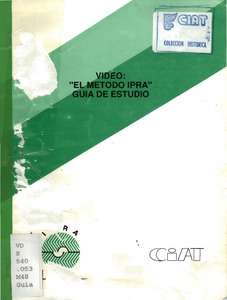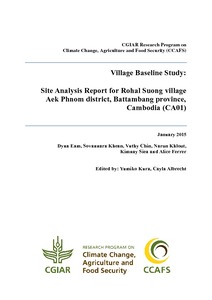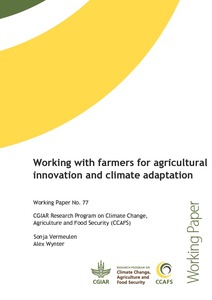Village Baseline Study: Site Analysis Report for Rohal Suong village Aek Phnom district, Battambang province, Cambodia (CA01)
This report presents findings from a village baseline study conducted in Rohal Suong village in Cambodia. Findings have been gathered from focus group discussions and participatory resource mapping with community members in Rohal Suong. The site analysis is part of the CGIAR Research Program on Climate Change, Agriculture, and Food Security (CCAFS) Baseline Survey work and provides information on community resources, the organizational landscape, and information networks at the village level.
Working with farmers for agricultural innovation and climate adaptation
The CGIAR Research Program on Climate Change, Agriculture and Food Security (CCAFS), in common with other CGIAR research programs, understands that farmers are at the centre of agricultural innovation and adaptation. This publication describes some of the many ways in which CCAFS works with farmers and farmers’ organizations to solve problems generated by climate change.
Workshop report: Analysis of trade-offs in agricultural systems
The objectives of the workshop were to (i) share and exchange experiences and lessons on available methods and tools to identify and analyse trade-offs in agricultural systems (at different levels: from household to landscape, regional and global level), (ii) to discuss and explore how we can apply the lessons learned within and between the respective CRPs, (iii) to explore potential for synergies and collaboration between scientists and programs on trade-off analysis in agricultural systems, (iv) to discuss how results from trade-off analysis research can be translated to end-users to achi
Wetlands of the Nile Basin: distribution, functions and contribution to livelihoods.
Wetlands occur extensively across the Nile Basin and support the livelihoods ofmillions of people. Despite their importance, there are big gaps in the knowledge about the current status of these ecosystems, and how populations in the Nile use them. A better understanding is needed on the ecosystem services provided by the difl:erent types of wetlands in the Nile, and how these contribute to local livelihoods.
Wetting and drying: reducing greenhouse gas emissions and saving water from rice production
A sustainable food future will require reductions in greenhouse gas emissions from agriculture even as the world produces substantially more food. The production of rice, the staple crop for the majority of the world’s population, emits large quantities of methane, a potent greenhouse gas. According to various governments, global rice production emits 500 million tons of greenhouse gases (carbon dioxide equivalent) per year—or at least 10 percent of total agricultural emissions.
What do we mean by participatory research in agriculture?
International Conference on Amazonian Agriculture and Land Use Research (1, 1980, Cali, Colombia). Amazonia: agriculture and land use research: Proceedings
Cambodian peasant's contribution to rural development: a perspective from Kampong Thom Province
The paper aims to identify the rationality of peasant communities and their contribution to rural development in Kampong Thom province. To do so, the authors explore the dynamics of land use and land tenure, the strategies of labor force allocation as well as the determinants of land and labor agricultural productivities amongst peasant communities. The research is based on field surveys in two communes. The researchers also analysed changes based on time-series aerial photos.
Guiding principles towards responsible agricultural investment in Lao PDR
A discussion note from Mekong Region Land governance (MRLG) summarizing findings and recommendations of a multi-stakeholder initiative and study tour conducted in Southern Laos, to study the social and environmental practices of two large scale companies holding large scale concessions in Lao PDR, published by MRLG in January 2017.







